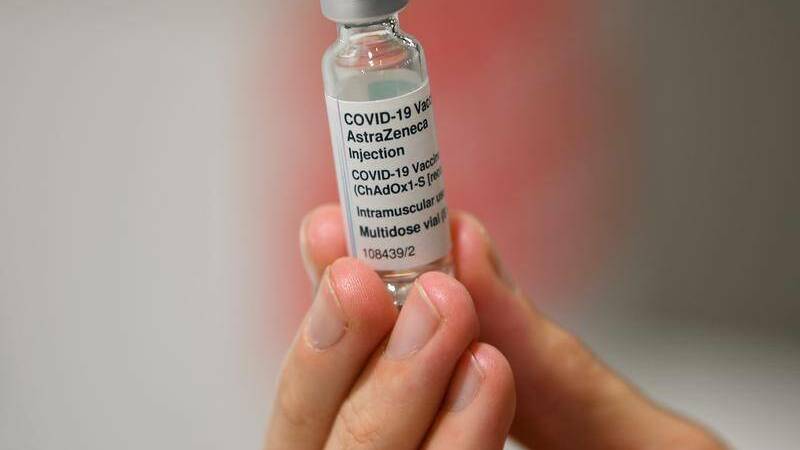
As the Therapeutic Goods Administration continues to closely monitor adverse events related to COVID-19 vaccines, doctors say the rare clotting condition linked to AstraZeneca remains "very different" from more common types of blood clots.
Subscribe now for unlimited access.
$0/
(min cost $0)
or signup to continue reading
So far the TGA has reviewed six cases believed to be thrombosis with thrombocytopaenia syndrome - or TTS.
The latest TGA data up to April 28 shows there has been 12,694 adverse events reported across 1,937,300 total doses of COVID vaccines administered Australia wide.
This equates to a reporting rate of 6.6 per 100,000 doses. Tasmania has one of the highest reporting rates in Australia, at 8.3 per 1000 doses, second only to Victoria, at 11.1 per 1000 doses.
IN OTHER NEWS:
Despite an increase in the number of adverse events being reported to the TGA in the past month, Public Health Tasmania's Dr Shannon Melody said it didn't mean the reaction was caused by the vaccine itself, with all reports of adverse events after an immunisation received by the Tasmanian Health Department and TGA.
"This condition [TTS] is very different to other more common blood clots, such as deep vein thrombosis or pulmonary embolism," Dr Melody explained.
"These more common blood clots can occur in around 50 Australians every day separate to vaccination and are not related to the rare TTS clotting disorder."
"If a report of a blood clot occurring in the days or weeks after vaccination is received, further information is gathered to assess whether it may be related to vaccination and whether it is consistent with the specific blood clotting syndrome."
This involves information relating to the timeline of the vaccination, including other risk factors for clotting, clinical details about the location and nature of the clot and whether the features characteristic of TTS are present - such as specific blood test results.
"At the national level, the TGA monitors all reports together to assess for safety signals and whether there is evidence of cause-and-effect," Dr Melody said.
TTS occurs from four to 20 days following the first dose of AstraZeneca vaccine and symptoms have generally been severe, requiring hospitalisation.
The Australian Technical Advisory Group on Immunisation estimates the overall rate of TTS is about six cases per million people vaccinated, but the rate is estimated to be higher (20 to 40 cases per million) in those under 50 years of age.
This week TGA head Professor John Skerritt said it was unlikely two deaths in NSW were linked to coronavirus vaccinations, with investigations underway after two men, 55 and 71, reportedly died from blood clots.
It is understood both men received the AstraZeneca jab, which is recommended for use only in people over 50 because of the TTS link. However, Professor Skerritt cautioned the public against making conclusions about the deaths and any potential link to AstraZeneca, saying the benefits of the vaccine "dramatically" exceed the risks.
From Monday, all Tasmanians over the age of 50 will be eligible to receive a COVID-19 vaccine as the state moves to accelerate the rollout of the AstraZeneca.
State Health Commander Kathrine Morgan-Wicks said GP respiratory clinics and state community clinics would be vaccinating any Tasmanian in this age group, with plenty of appointments available.
"The more Tasmanians who get vaccinated the more protected our community as a whole will be," she said.
To date more 76,457 Tasmanians have received a COVID vaccine. This includes 38,100 doses administered at state government clinics, 30,869 at the 96 GP clinics, and 7488 Commonwealth doses in aged care facilities.
It means 14 per cent of Tasmanians over 16 have received at least their first vaccine dose.
Ms Morgan-Wicks said there was 5000 appointments available in state government community clinics, for over 50s, during May, with more locations for state clinics, including additional Pfizer clinics for those under 50, to be announced soon.
What you need to know:
- State community clinics are located at: Kingston, New Norfolk, Brighton, Mowbray, Deloraine, Wynyard and Huonville.
- GP clinics will fully open to 50s+ Tasmanians on May 17 so please talk to your GP if they are participating to book an appointment. If you do not have a GP, you can book an appointment at a GP Respiratory Clinic or a State Community Clinic which is closest to you. GP Respiratory Clinic Derwent Park - call 03 6165 2367; GP Respiratory Launceston - call 03 6310 8310; GP Respiratory Clinic St Helens - call 03 6351 007
Visit coronavirus.tas.gov.au or call the Public Health Hotline 1800 671 738 to book.
Our journalists work hard to provide local, up-to-date news to the community. This is how you can continue to access our trusted content:
- Bookmark www.examiner.com.au
- Make sure you are signed up for our breaking and regular headlines newsletters
- Follow us on Twitter: @examineronline
- Follow us on Instagram: @examineronline
- Follow us on Google News: The Examiner


